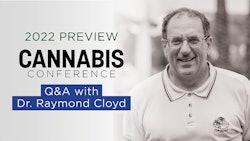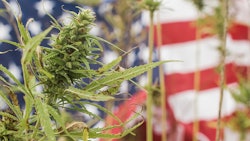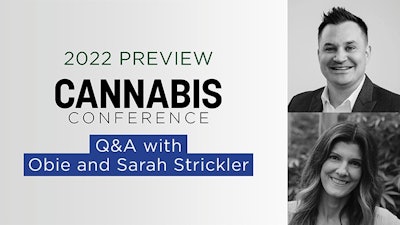
Successfully navigating the U.S. cannabis industry is a tall task for any operator, but the challenge is heightened when operating in multiple states with often varying regulations and specifications.
Grown Rogue, an Oregon-based multistate cannabis operator founded in 2016, expanded operations to Michigan in 2020 and has seen both markets mature at different paces and in different ways in recent years.
Obie and Sarah Strickler, the husband and wife duo and co-founders of Grown Rogue, joined Cannabis Business Times for this exclusive interview to shed light on what’s new at the company, why community involvement is so important in cannabis, their favorite current cultivars, and what Cannabis Conference attendees can expect to learn from them during their panel session, “How to Launch a Cultivation Business.”
Editor's note: Grown Rogue’s Obie and Sarah Strickler will be speaking on the panel session “How to Launch a Cultivation Business” from 11:20 a.m.-12:30 p.m. Aug. 23 at Cannabis Conference, taking place at the Paris Las Vegas Hotel & Casino. In this session, experienced and successful cannabis business leaders will share essential considerations when mapping out your start-up, along with some of the key lessons they’ve learned along the way. Visit www.CannabisConference.com for more information and to register.
Zach Mentz: What’s new at Grown Rogue in 2022, and what are you currently working on that you’re most excited about?
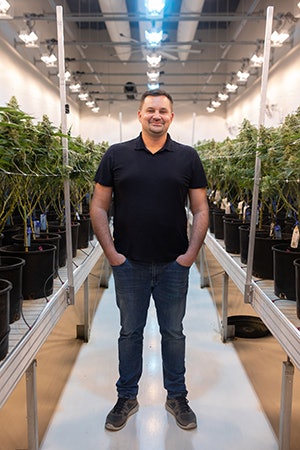
Obie Strickler: The biggest things in 2022 that we’re focused on are increasing our genetic portfolio as we really focus on what the consumer's looking for–that's where our niche sits. We're a craft, not a boutique, but a craft grower that understands what the right scale in each market is. And when you really want to win the hearts and minds of the consumer, the genetic lineup is really, really critical. We've made tremendous improvements in that focus of the business.
We've also continued building our Michigan infrastructure, so that's been a big part of 2022. We're just about to finish our 14th designated flower room there, and then we'll probably halt construction for a little bit as we let that absorb and the management of that work better.
And then we've been looking at taking our business model and what we do well and transitioning that into what will hopefully be our third market. Those kind of discussions and options and opportunities are in the works, but that's the next step for Grown Rogue as we look at what our growth and our expansion looks like.
Sarah Strickler: From a community side, we got together with our local university, Southern Oregon University, and we put together an internship program. We actually just completed our first internship [where] we allowed a student to come in and go through our whole program here. We titled it Seed To Sale. They got a crash course in every department of our business, and the feedback was tremendous from this student. We actually have several [students] now that are wanting to come in the fall term to take the course and do an internship program with us.
Obie and I also sit on several boards here locally and work interconnectedly with our community members and leaders here. We hosted a community roundtable with some of our local leaders [and we are] really putting a face on this industry locally and sticking true to what our thesis is about–transparency, honesty, education–and really promoting those in this region to better educate our community at large, and [they’re] learning about who we are as a company, what we do, our process and our method, and really what we believe in as our company culture.
RELATED: Cannabis Cultivator Grown Rogue Looks East
ZM: What else can you share about Grown Rogue’s new internship program? How long was the program?
SS: It started in the Spring term. We started talks with the University sometime in early 2021. They toured our facility and did some due diligence on us, so they vetted us for sure. Once they did that, the student got plugged in; he had asked to be placed within a cannabis company, and they put us together, and we created the Seed To Sale program, not knowing that it was going to need some work along the way, but we were able to pull it together. The team collaborated and we were able to create what I feel is a complete package of what we do and painted a really good picture for the student going forward of what the cannabis industry really is and what it looks like from the inside. It was awesome. He said it blew his mind, just what he learned and what he thought versus what the reality was.
ZM: How important is it to partner locally and make yourself known as a cannabis operator? How important is that to Grown Rogue?
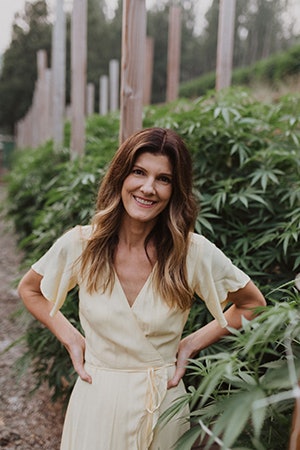
SS: To me personally, it's really important. I think this industry has been hidden for so long, and now to come out and really put a face and to help educate around what a business actually looks like in our communities and how it operates, I think it's really eye-opening for the folks in our community to actually have a trusted, safe place to go, to get accurate information. For those who are willing to put themselves out there, like Obie and I and Grown Rogue, to really say, ‘Hey, this is how we're doing it. This is what our business looks like. You may not like our product, but you can at least stand behind what our business stands for and what we're trying to overcome and face every day.’
ZM: Going back to Grown Rogue adding to its genetics portfolio, how exactly do you conduct that process? How do you go about selecting genetics and adding them to your portfolio?
OS: We really look at it like a tastemaker type process. Cannabis flower is a lot like fashion; it's coming in and out of style very quickly, and you're always trying to predict what the next style might be [to] be prepared for it.
We have a very rigid genetic plan with how we run our crop scheduling. Our team has a genetic meeting every couple of weeks. We're looking at not only what we're doing today, but how that relates to the overall portfolio of products that we like to put to our consumers that meet the different kind of facets of whether it's gassy or purple or fruity–those kinds of pieces of potency. It’s just hard work by the team. They're constantly searching and hunting, trying to find the next thing that's going to be available that's going to meet all of our criteria.
We do some internal pheno-hunting where we're doing our own breeding and genetic programs that bring in stuff that's very proprietary to us. But really, it's just being out in front of it and having a team that really understands that tastemaker component. My role is to organize that information into a menu of what we're going to produce over the next 6 to 12 months. I think a lot of people don't realize that the selection we make today, that flower is not ready for the consumer for five months. So, there's a pretty long process, and that predictive input is really, really important. We don't always get it right. We're pretty good, we're getting better, but it's been a big focus of our team over the last year.
ZM: As a multistate operator in Michigan and Oregon, what are some of the challenges Grown Rogue is facing in each of those markets right now? How are you overcoming those challenges? And what are some of the opportunities you see in those markets you're really excited about?
OS: The biggest issue right now for us is pricing. Cannabis is very volatile. It’ll move by hundreds of dollars a pound over the course of a very short timeline, so your predictive forecasting is really difficult. That is probably our biggest single challenge, and that's in both markets. Michigan has compressed pretty heavily as it goes through its maturation cycle, like every market does, and we're prepared for it and we're as efficient as any company in the U.S. So, we're able to navigate, but it makes it really difficult to predict or plan for capital expenditures and things like that. We're a small public company, so we have a corporate overhead that definitely puts a drain on some of those resources.
As far as opportunities, we continue to win market share. In Oregon, we're by far the largest indoor producer in the state. We have, I think this month (July), close to 20% of the flower market under LeafLink, which is one of the platforms that we use. That is a pretty good penetration across the state because we're producing really good product. Those opportunities are continued through these challenging times to produce a cost-effective, high-quality product that the consumer wants, and that's what we want to do in both states. We're doing the same thing in Michigan while launching some new products–we're looking at pre-rolls and things like that.
ZM: What are some Grown Rogue products available in the market right now that are really popular or you particularly like?
OS: Georgia Pie is my favorite right now. Love that strain. It's good. And then one we've bred internally is called the Sourdough, which is really interesting. But at this point, I'd say 80 to 90% of our lineup, we're really, really pleased with.
SS: Gary Payton. I always love the look of that one, and basketball is near and dear to our hearts. (Editor’s Note: Sarah played college basketball at both University of Hawaii and Southern Oregon University.)
ZM: The Cannabis Administration and Opportunity Act was filed in the Senate in late July. How would potential federal legalization impact Grown Rogue?
OS: It would have a big impact. I think we're probably positioned as well as anyone to take advantage of that, and the reason I say that is because we operate in some of the most price-competitive markets, and what you don't have in the U.S. right now is price parity. The example I’ll give is if you want a bottle of really good Napa Valley wine, you might get a slight difference in pricing based upon state, but generally, if it's a $200 bottle of wine in California, it's going to be a $200 bottle of wine in New York, and so you don't get this big price disparity.
The markets we operate in, price disparity is massive, so [federal legalization] would allow us to get some uniformity there. You’d see vacuum of operators like us who are efficient and have their stuff together shipping product into these markets where the pricing regime is much stronger, and it would really help with our financial success.
And it would be good for the industry and good for people in general. It's time for the government to move this forward. The people have spoken; if you took a popular vote across the U.S., I'm pretty sure it would pass, and it'll get there eventually.
ZM: Looking forward to the rest of this year and beyond, what else are you and Grown Rogue excited about as a company?
SS: From a community standpoint, we're looking forward to furthering that relationship with our university and seeing where that goes and helping build out what I believe Southern Oregon to be–a predominant player going forward in the cannabis industry and markets. So, we’re really helping to just put that good face and good image here for Southern Oregon.
OS: It’s just continuing to build upon the foundation we’ve set. The things our team has done from community, from process, technical, new markets, new products–we’ve really got a foundation now that we're very confident in and is performing very well.
How do we grow that? We really continue to focus on the consumer. I think that's what a lot of companies miss–they're run by financial engineers or Wall Street folks, and they don't have the passion that I think companies like ours does for the product. And that's what most businesses are built on–they're built upon seeing an opportunity to provide something that is missing for a consumer. And unfortunately, in cannabis, for a lot of the businesses that have been built, that wasn't the real intent. It was more about, can we make money? They're overcharging, the quality's poor, and so ultimately the consumer’s suffering. So, we spent a lot of time thinking about that, and we want happy people, and that's what cannabis was built upon. It's a very social product. People enjoy consuming it in social settings with big groups and they want to have good stuff, so that's what we want to focus on.
ZM: With Cannabis Conference just a few weeks away Aug. 23-25 at Paris Las Vegas Casino & Hotel, what can attendees expect to learn from your panel session “How to Launch A Cultivation Business”?
OS: I think they'll learn a lot. We've been through so many different ups and downs and learning experiences, so I think they'll get a good understanding of the building blocks it takes to build a cultivation company, where some of the pitfalls might lie and where the opportunities are. We'll probably focus some on not chasing the shiny objects and staying disciplined.
Sarah and I are pretty transparent, so it’s not going to be all just ‘it's tons of money and easy.’ It's a lot of work and sacrifice and commitment that goes into building a business. I'm looking forward to it. It'll be a good opportunity for people to come and hear from seasoned veterans in this space who have taken our own approach and come out the other side in a successful way.
SS: Obie and I are the real deal. We're building a company together and we're a team and you're going to get the real ins and outs of what it takes–the good, the bad, all of it. You're going to hear it from people who are actually living it and still doing it and pushing forward. I think people will come away learning a lot about just the realism of what it takes to build a cultivation company.












